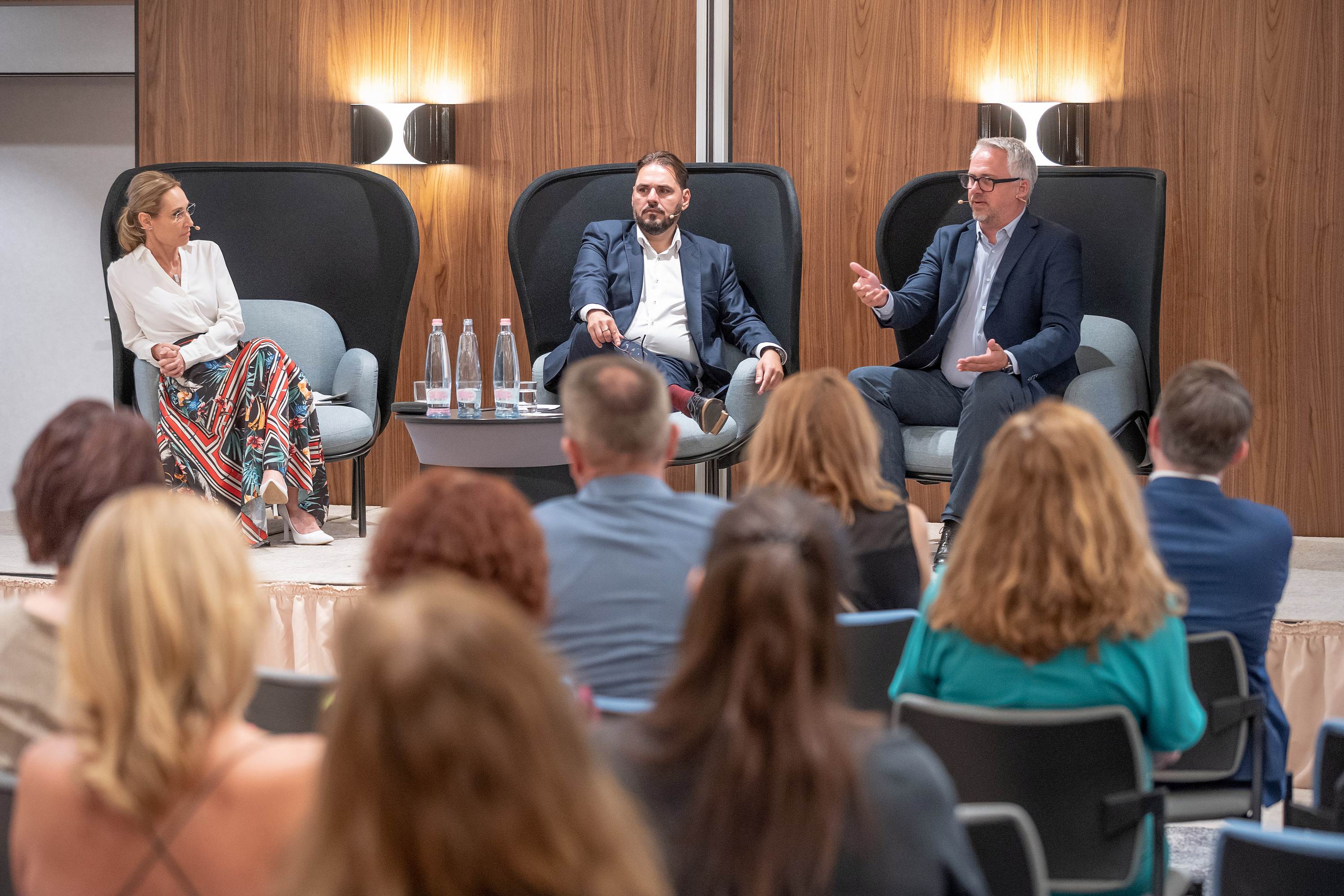AI is Already Here: People, Businesses Must Learn to use It

From left, moderator Krisztina Bombera, George A.Tilesch and Erik Slooten engage with the audience.
In 2022, the question for the C-Suite is no longer whether it should use artificial intelligence to compete successfully but how to do so well. How do you find an AI-augmented enterprise strategy and bulletproof results with a clear return on investment that is made future-proof by being built responsibly? These and other AI questions were discussed at a Dutcham event.
Artificial intelligence is profoundly and speedily transforming enterprises, industries and the economy. According to the majority of the executives, AI is now mainstream, representing a fundamental shift. C-suiters also think that the accelerating impact of the pandemic is apparent here. AI adoption is at a turning point: most companies have already engaged with AI in at least one strategic business function.
At the same time, AI is the first-ever “moral technology” that needs us to become better humans to be able to control it. The human factor should be the starting point in embracing AI technologies at any corporation. With human-centric, responsible AI adoption strategies, companies can build long-term capabilities and avoid the moral obstacles in talent, revenue and reputation risks.
“Augmented leadership successfully combines the best of the digital age with the best of the human mind, and all for the right purpose,” Erik Slooten, of T-Systems International, told the event, organized by the Netherlands-Hungarian Chamber of Commerce (Dutcham), alongside the Business Council for Sustainable Development in Hungary and the Joint Venture Association.
Slooten, a Dutch national, is the global leader of delivery quality and transformation cloud service for the German multinational and was also the Budapest Business Journal’s Expat CEO of the Year 2021. He has a background in telecommunication and IT engineering for 24 years, championing innovation and AI in internal programs and relationships with universities.
“AI is a liberating, strengthening technology, and if you, as a leader, don’t implement a strategy very consciously around it, to invest in a community inside your company, that liberates people and educates them on how to use it, how to help each other, how to develop ideas and how to make the company a better place; you’re missing the game,” Slooten told the audience. He added that not using AI as a company is the equivalent of not using cars.
Inescapable AI
Slooten also came up with another analogy. According to him, previously, nobody thought that using mobile phones would be the norm, “but here we are.” He thinks the situation is the same with AI: everybody needs to get used to it because it’s almost inescapable.
“AI surrounds everybody,” he said, adding that, even now, the AI in the smartphones were listening to what he said. “Even if you don’t have a phone, your neighbor has one.”
Slooten remarked of his workplace that every department of Deutsche Telekom educates itself about the concept of and necessity for AI.
The other speaker at the Augmented Leadership discussion, George A.Tilesch, president of the PHI Institute for Augmented Intelligence, emphasized potential biases in his speech. According to him, AI will be the driving force behind several leading technologies in the near future. It will also exponentially grow and directly affect our personal and business life.
“Developers started sharing their fears about controlling these developments and the potential threat they can mean for humanity, but AI is the path we are on towards machines that can learn,” Tilesch said.
He emphasized that the capabilities of very robust AI systems and intelligent software are accumulating vast data and making decisions that already influence our lives; we are at a tipping point today. Tilesch highlighted the responsibility of governments to be transparent regarding the AI solutions they use and provide for their citizens.
Nuclear Analogy
After the two keynote speeches, event host journalist Krisztina Bombera talked with Tilesch and Slooten about different perspectives on AI. The main question of the conversation was how to use AI well in the future.
“Why is the analogy with the nuclear bomb not applicable to AI? What’s the difference?” asked Bombera. Tilesch said that if we let AI make moral decisions, that is the fault of the person who made it happen. We need to control it continuously and personally.
Slooten added that AI cares more about people than governments do. He thinks that AI is more fact-based and less illogical. He finds AI more objective in checking facts and doing research. He is not convinced that AI as a technology has “evil” thoughts or, indeed, any kind of personal side. “AI is more neutral than most people,” Slooten said.
“Still, how can we control AI, or do we need to control it at all?” asked Bombera.
Slooten thinks that you can’t and shouldn’t as an individual seek to control AI because you can’t. “But how do we develop sustainable AI?” asked someone from the audience.
“Since there is no moral code in AI at the moment, this is probably the million dollars question,” Slooten and Tilesch concluded.
This article was first published in the Budapest Business Journal print issue of July 1, 2022.
SUPPORT THE BUDAPEST BUSINESS JOURNAL
Producing journalism that is worthy of the name is a costly business. For 27 years, the publishers, editors and reporters of the Budapest Business Journal have striven to bring you business news that works, information that you can trust, that is factual, accurate and presented without fear or favor.
Newspaper organizations across the globe have struggled to find a business model that allows them to continue to excel, without compromising their ability to perform. Most recently, some have experimented with the idea of involving their most important stakeholders, their readers.
We would like to offer that same opportunity to our readers. We would like to invite you to help us deliver the quality business journalism you require. Hit our Support the BBJ button and you can choose the how much and how often you send us your contributions.









